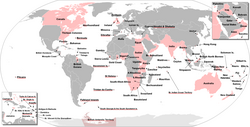User:BNPUP/British Empire
British Empire | |
|---|---|
|
Flag | |
 All parts of the world which were ever in the British Empire. The names of the current British Overseas Territories are underlined in red. |
The British Empire was made up of the colonies, protectorates, mandates and other territories which were controlled by the United Kingdom.
It began with the overseas colonies and trading posts set up by England between the late 16th and early 18th centuries. At its height, it was the largest empire in history, and the world's most powerful superpower for more than a century.[1] By 1922, more than 458 million people lived in the British Empire, which was more than one fifth of the world's population at that time.[2] The empire was larger than 33,700,000 km2 (13,012,000 sq mi), almost a quarter of the Earth's total land area.[1]p15 Since it was so large, the British Empire has left a large legal, linguistic and cultural legacy. Like the Spanish Empire before it, the British Empire was often said to be "the empire on which the sun never sets" because it was so large that the sun was always shining somewhere in the empire. The Empire controlled land on every Continent.
During the Age of Discovery in the 15th and 16th centuries, Portugal and Spain were the first countries to begin exploring. This allowed them to create large and rich colonial empires. Jealous of how rich Spain and Portugal became because of their empires, England, France, and the Netherlands began to make colonies and trade networks of their own in the Americas and Asia.[1]p2 England fought and won some wars in the 17th and 18th centuries against the Netherlands and France. After these wars, England (and then, after the union between England and Scotland in 1707, Great Britain) became the main colonial power in North America and India.
New empire
changeWhen the Thirteen Colonies became independent in the American War of Independence, the British Empire lost some of its oldest and most important colonies. Britain then began focusing on Asia, Africa, and the Pacific. After defeating Napoleonic France in 1815, Britain became the world's only superpower for more than a century and made its empire even larger.
By the start of the twentieth century, the economies of Germany and the United States had begun catching up to Britain, especially in their industrialisation.
The First World War damaged all of Europe. Having taken most of the German overseas colonies, the British Empire was at its largest after World War I, but by now the United States was the greatest industrial power. In the Second World War, Japan took the colonies of Britain and other European countries in South-East Asia. The allies (principally U.S. forces) eventually defeated Japan. Britain's prestige in Asia was damaged. This caused the empire to decline more quickly.[3]
The British Raj included the whole of the Indian subcontinent.[4] The independence of the two states of India and Pakistan in 1947 was the first and most important step in decolonisation. Britain also gave independence to most of the territories of the British Empire. After the UK transferred Hong Kong back to China in 1997, the British Empire was essentially over.[5][6][7][8] However, Britain still controls some overseas territories. After they were given independence, many countries which used to be British colonies joined the Commonwealth of Nations. Sixteen Commonwealth countries have the same head of state, Queen Elizabeth II, and are Commonwealth realms.
References
change- ↑ 1.0 1.1 1.2 Ferguson, Niall 2004. Empire, The rise and demise of the British world order and the lessons for global power. Basic Books. ISBN 0-465-02328-2.
{{cite book}}: CS1 maint: numeric names: authors list (link) - ↑ Maddison, Angus 2001. The world economy: a millennial perspective. Organisation for Economic Co-operation and Development, p98, 242. ISBN 92-64-18608-5
- ↑ Brown, Judith M. & Louis, Wm. Roger (eds) 2001. Oxford history of the British Empire: the twentieth century. Oxford University Press. ISBN 978-0-19-924679-3
- ↑ The Raj was never a colony, because it was never intended or used as a place of settlement.
- ↑ Brendon, Piers 2007. The decline and fall of the British Empire, 1781–1997. New York: Random House, p660. ISBN 0-224-06222-0
- ↑ "Charles' diary lays thoughts bare". BBC News. 22 February 2006. Retrieved 13 December 2008.
- ↑ Brown, Judith M. 1994. Modern India: the origins of an Asian democracy. Oxford University Press, p594. ISBN 978-0-19-873113-9
- ↑ "BBC – History – Britain, the Commonwealth and the end of Empire". BBC News. Retrieved 13 December 2008.
Other websites
change- British Empire -Citizendium
[[Category:British Empire| ]] [[Category:History of Pakistan]] [[Category:History of Canada]] [[Category:British India]]
